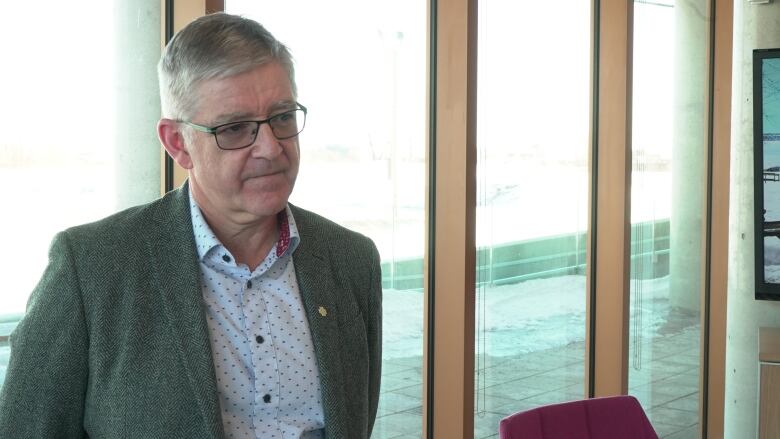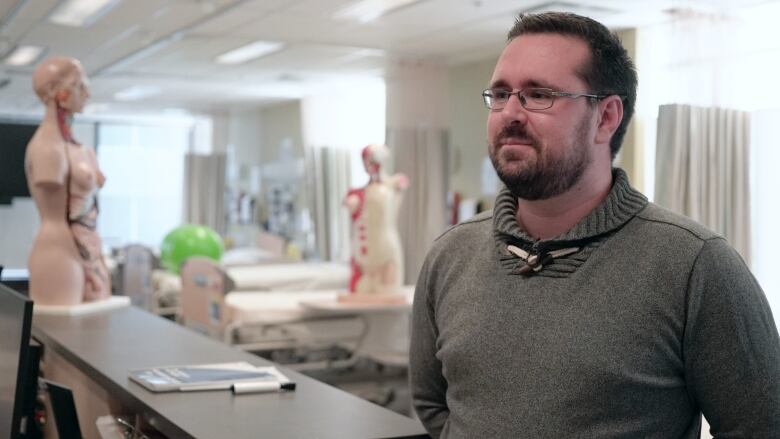Quebec Order of Nurses looks to abolish licensing exam for nurse practitioners
Order says exam is redundant, others claim it is vital for standard of care

As Quebec moves to give more responsibilities to nurse practitioners, the Quebec Order of Nurses (OIIQ) is quietly taking steps to eliminate the licensing exam required to practise.
In an email sent to members last week and obtained by CBC News,the OIIQ saidit has asked for an amendment which would allow nurse practitioners to receive their certification upon graduation without taking a licensing exam.
If the amendment is accepted, "the examinations of [nurse practitioners] as a condition of obtaining the specialist's certificate would be abolished," the emailreads.
The licensing exam is for nurse practitioners who just completed their schooling andclinical work.
The exam itselfconsists of three evaluations over two days, including simulations, critical thinking questions and case scenarios.
Luc Mathieu, the president of the OIIQ, calls it"redundant."
"It's as if we are doing a double evaluation on [the nurse practitioners'] knowledge," he said.
Ifabolished, Quebec would be the only province in Canada not to have a licensing exam for nurse practitionersupon graduation.
The request for the amendment is now before theOffice des professions du Qubec the government body that oversees professional orderswhichwill hold a consultationbefore making a final decision.
Health Minister Danielle McCann says the province needs more nurse practitioners, and she's not concerned about the change.
"If it's a step less, we are going to have the nurse practitioners more quickly with us," she said.
"But of course, the responsibility is with the order, and it has to be done the right way, which they are doing, I'm sure."
Exam is 'extremely important'
Prof. Yannick Mlanon Latre, who teaches atMcGill University'sschool of nursing, believes the licensing exam is vital.
"These exams are built to assess the basic standard for the profession," he said.
"We want to keep the quality, and we want an independent method of evaluation."
He saidthe OIIQ'sexam means that a standard is met no matter which university a nurse practitioner attends.
"Wehave similar programs, but there are different ways of teaching it, different ways to assess our students," he said.
"So, a professional independent exam makes sure to meet at least the minimal criteria to have a safe practice, and it's safer, from my point of view, for the public."

Limited consultation
Luc Mathieu said the OIIQ consulted with, and got approval from severalpartners before arriving at its decision including the College of Physicians and the Bureau deCooprationInteruniversitaire(BCI).
"We cannot comment on the OIIQ's desire to get rid of the exam,"CarolineLangis, a spokesperson for the College of Physicians wrote."It is the role of the OIIQ to ensure that future nurse practitioners develop the necessary competence to practise."
The BCI did not respond to requests for comment.
TheAssociation des infirmires praticiennes spcialises du Qubec was not included in the consultations, which they said were done before Mathieu took over as presidentin November.
"Due to the knowledge we currently have on this file, we do not agree with the withdrawal of the licensing exam," AIPSQ presidentChristine Lalibertsaid.
"We are open to a new review formula if the process is too cumbersome in its current form but not complete withdrawal."
Lalibert adds that the association hopes to collaborate with the order and will withhold any recommendations until consultations are held by theOffice des professions du Qubec.
More powerto nurses
Earlier this week, McCannannounced she wants to give specialized nurse practitionersthe power to diagnose certain chronic illnesses in a bid to reduce the backlog inthe province's health system.
McCann said the change would allow nurse practitionersto use their full set of skills while freeing up doctors to do other work.
As it stands, she said, nurse practitionershave to be supervised by a family physicianand patients are required to follow up with a doctor 30 days after visiting a nurse practitioner.
McCann said she has been in talks with the College of Physicians about the issue and that she wants to make the changewhich will require modifying provincial legislationin the next year.
There aremore than 400 nursepractitioners working in clinics and hospitals across the province.
The previous Liberal government also sought to give more power to nurse practitioners, long hailed as a solution to the province's health care woes.
with files from Benjamin Shingler












_(720p).jpg)


 OFFICIAL HD MUSIC VIDEO.jpg)
.jpg)



























































































